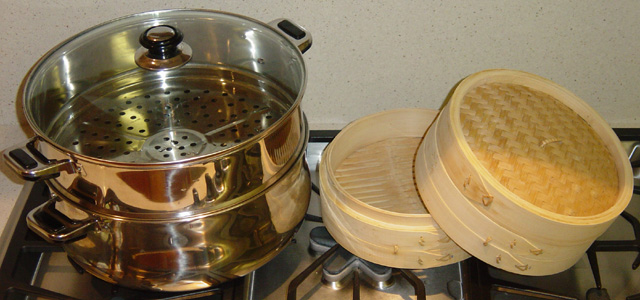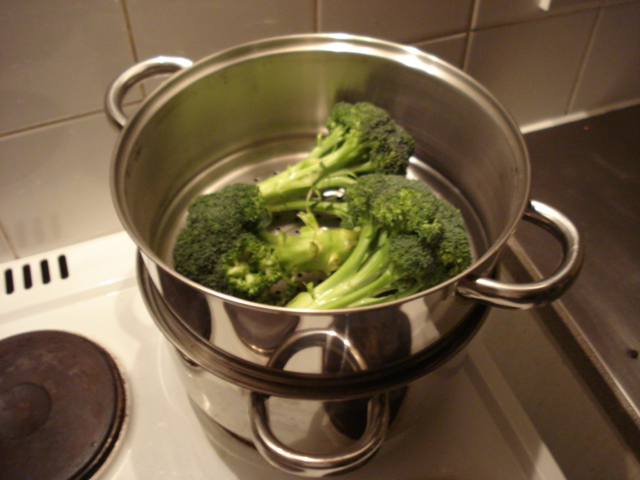Food Steamer on:
[Wikipedia]
[Google]
[Amazon]
A food steamer or steam cooker is a small kitchen appliance used to cook or prepare various foods with steam heat by means of holding the food in a closed vessel reducing steam escape. This manner of cooking is called steaming.

 Food steamers have been used for centuries. The ancient Chinese used pottery steamers to cook food. Archaeological excavations have uncovered pottery cooking vessels known as ''yan'' steamers: a ''yan'' was composed of two vessels, a ''zeng'' with a perforated floor surmounted on a pot or caldron with a tripod base and a top cover. The earliest ''yan'' steamer dating from about 5000 BC was unearthed in the
Food steamers have been used for centuries. The ancient Chinese used pottery steamers to cook food. Archaeological excavations have uncovered pottery cooking vessels known as ''yan'' steamers: a ''yan'' was composed of two vessels, a ''zeng'' with a perforated floor surmounted on a pot or caldron with a tripod base and a top cover. The earliest ''yan'' steamer dating from about 5000 BC was unearthed in the

History

 Food steamers have been used for centuries. The ancient Chinese used pottery steamers to cook food. Archaeological excavations have uncovered pottery cooking vessels known as ''yan'' steamers: a ''yan'' was composed of two vessels, a ''zeng'' with a perforated floor surmounted on a pot or caldron with a tripod base and a top cover. The earliest ''yan'' steamer dating from about 5000 BC was unearthed in the
Food steamers have been used for centuries. The ancient Chinese used pottery steamers to cook food. Archaeological excavations have uncovered pottery cooking vessels known as ''yan'' steamers: a ''yan'' was composed of two vessels, a ''zeng'' with a perforated floor surmounted on a pot or caldron with a tripod base and a top cover. The earliest ''yan'' steamer dating from about 5000 BC was unearthed in the Banpo
Banpo is an archaeological site discovered in 1953 by Shi Xingbang, and located in the Yellow River Valley just east of Xi'an, China. It contains the remains of several well organized Neolithic settlements, like Jiangzhai, carbon dated t ...
site. In the lower Yangzi River
The Yangtze or Yangzi ( or ; ) is the longest river in Asia, the third-longest in the world, and the longest in the world to flow entirely within one country. It rises at Jari Hill in the Tanggula Mountains (Tibetan Plateau) and flows ...
, ''zeng'' pots first appeared in the Hemudu culture
The Hemudu culture (5500 BC to 3300 BC) was a Neolithic culture that flourished just south of the Hangzhou Bay in Jiangnan in modern Yuyao, Zhejiang, China. The culture may be divided into early and late phases, before and after 4000 BC respec ...
(5000–4500 BC) and Liangzhu culture
The Liangzhu culture (; 3300–2300 BC) was the last Neolithic jade culture in the Yangtze River Delta of China. The culture was highly stratified, as jade, silk, ivory and lacquer artifacts were found exclusively in elite burials, while pottery ...
(3200–2000 BC) and were used to steam rice; ''yan'' steamers were also unearthed in several Liangzhu sites, including 3 found at the Chuodun and Luodun sites in southern Jiangsu
Jiangsu (; ; pinyin: Jiāngsū, alternatively romanized as Kiangsu or Chiangsu) is an eastern coastal province of the People's Republic of China. It is one of the leading provinces in finance, education, technology, and tourism, with its ca ...
. In the Longshan culture
The Longshan (or Lung-shan) culture, also sometimes referred to as the Black Pottery Culture, was a late Neolithic culture in the middle and lower Yellow River valley areas of northern China from about 3000 to 1900 BC. The first archaeological fi ...
(3000–2000 BC) site at Tianwang in western Shandong, 3 large ''yan'' steamers were discovered.Underhill, Anne P. (2002). ''Craft Production and Social Change in Northern China''. New York: Kluwer Academic/Plenum Publishers. pp. 156 & 174. .
Advantages
Most steam cookers also feature a juice catchment which allows all nutrients (otherwise lost as steam) to be consumed. When othercooking techniques
This is a list of cooking techniques commonly used in cooking and food preparation.
Cooking is the art of preparing food for ingestion, commonly with the application of heat. Cooking techniques and ingredients vary widely across the world, refle ...
are used (e.g., boiling), these nutrients are generally lost, as most are discarded after cooking.
Due to their health aspect (cooking without any oil), food steamers are used extensively in health-oriented diets such as ''cuisine minceur Cuisine minceur (; ) is a style of cooking created by French chef Michel Guérard, which recreated lighter versions of traditional nouvelle cuisine dishes. Contemporary critics acknowledged that the minceur versions by Guérard tasted better and w ...
'', some raw food diet
Raw foodism, also known as rawism or a raw food diet, is the dietary practice of eating only or mostly food that is uncooked and unprocessed. Depending on the philosophy, or type of lifestyle and results desired, raw food diets may include ...
s, the Okinawa diet
The Okinawa diet describes the eating habits of the indigenous people of the Ryukyu Islands (belonging to Japan), which is believed to contribute to their exceptional longevity. It is also the name of a weight-loss diet based on this.
Longevit ...
, a macrobiotic diet
A macrobiotic diet (or macrobiotics) is a fad diet based on ideas about types of food drawn from Zen Buddhism. The diet tries to balance the supposed yin and yang elements of food and cookware. Major principles of macrobiotic diets are to reduce ...
, or the CRON-diet.
Food steamers release less heat to the kitchen environment, therefore helping keep the kitchen cool during hot summers.

See also
* Food processing *List of cooking appliances
This is a list of cooking appliances that are used for cooking foods.
Cooking appliances
* Air fryer
* Bachelor griller
* Barbecue grill
* Beehive oven
* Brasero (heater)
* Brazier
* Bread machine
* Burjiko
* Butane torch
* Chapati m ...
* List of cooking vessels
This is a list of cooking vessels. A cooking vessel is a type of cookware or bakeware designed for cooking, baking, roasting, boiling or steaming. Cooking vessels are manufactured using materials such as steel, cast iron, aluminum, clay and va ...
* List of steamed foods
This is a list of steamed foods and dishes that are typically or commonly prepared by the cooking method of steaming.
Steamed foods
* Ada – a food item from Kerala, usually made of rice flour with sweet filling inside.
* Bánh – in Hanoi ...
* Bamboo steamer
Bamboo steamers, called ''zhēnglóng'' () in Chinese,it originated in Han Dynasty.
The most famous kind of bamboo steamers are used in Chinese cuisine and date back to 5,000 years in Southern China. They are produced by removing the skin from ...
* Pressure cooking
Pressure cooking is the process of cooking food under high pressure steam and water or a water-based cooking liquid, in a sealed vessel known as a ''pressure cooker''. High pressure limits boiling, and creates higher cooking temperatures which ...
* Rice cooker
A rice cooker or rice steamer is an automated kitchen appliance designed to boil or steam rice. It consists of a heat source, a cooking bowl, and a thermostat. The thermostat measures the temperature of the cooking bowl and controls the heat. ...
, a cooking appliance that may have a food steaming capability
* Siru
''Siru'' () is an earthenware steamer used to steam grain or grain flour dishes such as ''tteok'' (rice cakes).
Gallery
Si-lu (side2).jpg, A Bronze Age ''siru''
See also
* List of cooking vessels
* Bamboo steamer
* ''Siru-tteok
S ...
, earthenware steamer
References
{{reflist Ancient inventions Chinese inventions Cooking appliances Cooking vessels Food preparation appliances